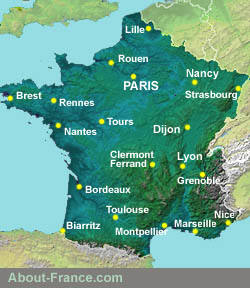- Explore France ►
- Essential pages
- Travel in France
- Where to go
- What to see and do
French grammar - verbs
French verbs and how to use them
| Page Index | The nature of French verbs | Types of verb |
| Tenses and moods | Active and passive |
►
► This page
is a general introduction to French
verbs and verb forms.
For more detail - tenses, irregular verbs, etc. - return to the Grammar index or follow the links.
For more detail - tenses, irregular verbs, etc. - return to the Grammar index or follow the links.
1. The nature of French verbs
French verbs are unlike English verbs, in that they depend heavily on the use of conjugated tenses. In English, most verbal forms involve using at least two words (such as am eating, was going, have been broken, would go); in French, a large number of the most common verbal forms use just a single word, though some, like English, use two, or even three words. Examples:Je
mange
Il allait
Ils ont été cassés
Nous irions
Il mangeait
Il allait
Ils ont été cassés
Nous irions
Il mangeait
I am eating
He was going
They have been broken
We would go
He was eating
He was going
They have been broken
We would go
He was eating
2. Types of verb in French
Regular and irregular French verbs
French verbs are generally classified either as regular verbs, or as irregular verbs. There are three main categories of French regular verbs,- regular verbs with an infinitive ending in -er, such as manger,
- regular verbs with an infinitive in -ir, such as finir,
- regular verbs with an infinitive in -re, such as vendre.
Transitive or intransitive?
As in other languages, French verbs can either be transitive or intransitive. Certain verbs in French can be either transitive or intransitive, according to the context in which they are used. Transitive verbs require an object (or complément d'objet direct - C.O.D. in French), and can be used in the passive voice as well as the active. Intransitive verbs do not take an object, and do not have passive forms. (See below: voices)► Transitive: porter,
faire, avoir,
mettre - these all require an object
Intransitive : dormir, mourir, aller, venir, - these cannot take an object
Verbs that can be either : manger, boire, écrire
Intransitive : dormir, mourir, aller, venir, - these cannot take an object
Verbs that can be either : manger, boire, écrire
3. Tense, mood
French verb tenses are derived from the tenses of Latin.Verbs can be conjugated in the indicative and subjunctive moods
The simple tenses - which are all in the active voice - are as follows. Sample verb, manger in the third person singular (for full tense conjugations, refer to pages for the tenses in question).
| Tense |
Indicative | Subjunctive |
| Présent | Il mange | il mange |
| Futur | II mangera | - |
| Prétérit | Il mangea | il mangeat |
| Imparfait | il mangeait | - |
| Conditionnel | il mangerait | - |
| Tense |
Indicative | Subjunctive |
| Passé composé | Il a mangé | il ait mangé |
| Passé antérieur | il
avait mangé (il eut mangé) |
il eût mangé |
| Passé conditionnel | Il aurait mangé | - |
Most tenses of transitive verbs exist also in the passive voice (see below).
For more details, see...
- The present tense in French.
- The future tense in French.
- past tenses in French.
- The subjunctive in French
Aspect in French verbs.
By
aspect,
we mean whether an action is momentary
or instant,
or whether it is progressive
or ongoing.
In English,
aspect is expressed almost exclusively through the use of
auxiliaries: compare
I
eat potatoes and
I am
eating potatoes, or I
drove
the car and I was
driving the car.In French the present tense does not have any particular aspect. Je mange can mean either I eat or I am eating. In the past, the imperfect tense has a progressive aspect, so Je mangeais means I was eating while J'ai mangé and je mangeai both mean I ate - or I have eaten (confusing!).
More on this on the past tenses page.
Modal forms
Other verb forms are formed using what in English we consider to be modal verbs: the French equivalents to English modal verbs are pouvoir and devoir. See modal verbs in French.4. Voices: active and passive
French transitive verbs can be conjugated in the active and the passive voices.Active forms have been dealt with above.
The passive tenses are formed with the help of the auxiliary être, followed by the past participle of the verb. This is the procedure for forming the passive of both simple tenses and compound tenses.
Passive forms of active simple tenses
| Tense |
Indicative | Subjunctive |
| Présent | Il est mangé | il soit mangé |
| Futur | II sera mangé | - |
| Prétérit | Il fut mangé | il fût mangé |
| Imparfait | il était mangé | - |
| Conditionnel | il serait mangé | - |
Passive forms of active compound tenses
| Tense |
Indicative | Subjunctive |
| Passé composé | Il a été mangé | il ait été mangé |
| Passé antérieur | II avait été mangé | il eût été mangé |
| Passé conditionnel | Il aurait été mangé | . |
| Imparfait | il était mangé | . |
| Conditionnel | il serait mangé | . |



